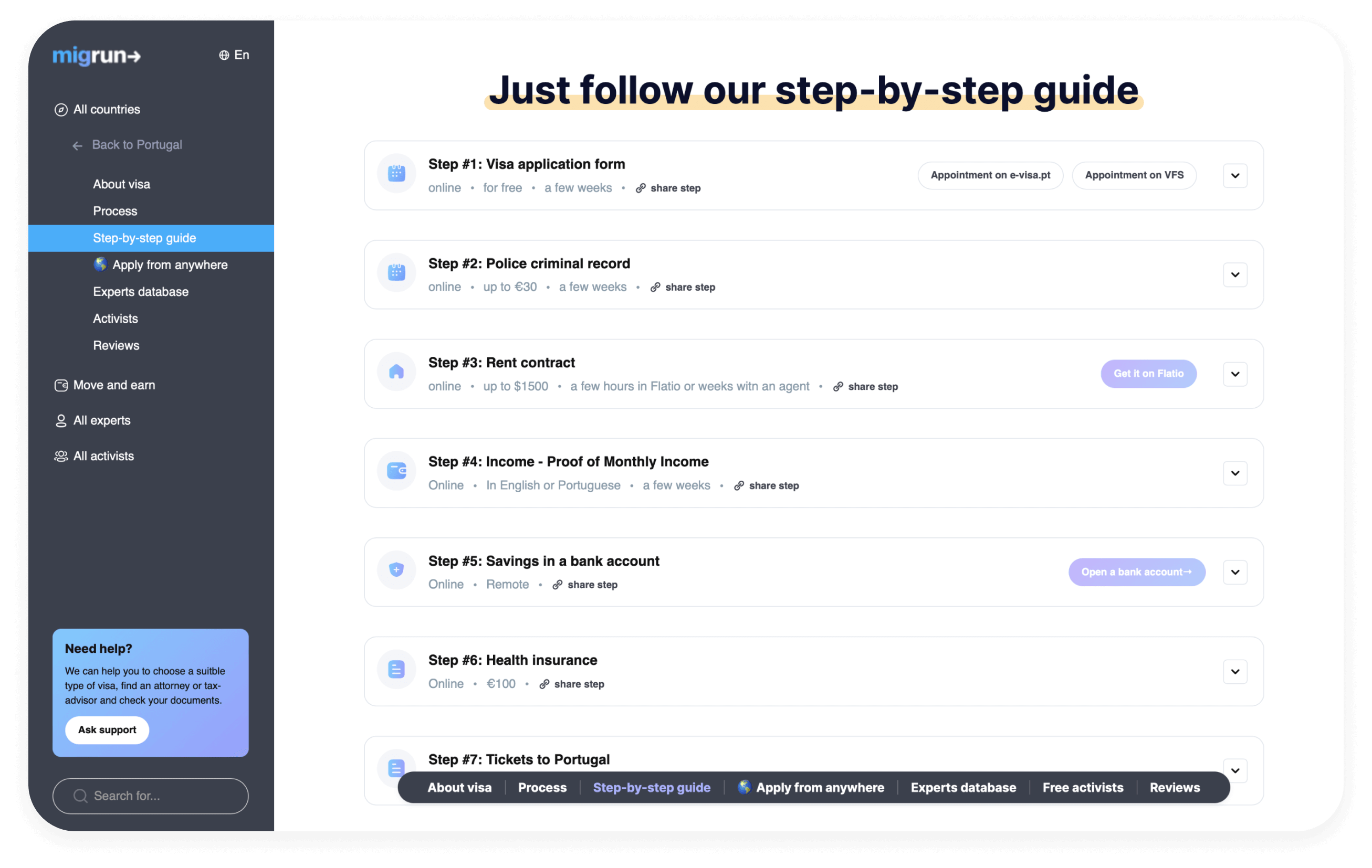MigRun wants to simplify the process of immigrating to a new country | TechCrunch
Two year ago, after Vlad Shipilov, a Russian immigrant, moved to Portugal, his business visa was denied because his lawyer wasn’t aware of certain requirements pertaining to visa applications originating from Russia. It ultimately took $16,000, joining immigration groups on Telegram and Facebook and the help of a Portugal-based friend to secure Shipilov his visa — and residency.
Shipilov quickly came to realize that his experience wasn’t unique.
“I found that there were many ‘handlers’ and scammers in this market,” Shipilov told TechCrunch in an email interview. “For instance, Portuguese passive-income visa consulting agencies can cost $3,000, $5,000 or even $8,000, while lawyers charge $800 to $1,000 — and none of them provide any guarantees. I believe that your immigration should inspire you, not cause stress and make you pay for nothing.”
So Shipilov, along with the friend he met in Portugal, Sergey Kotlov, started writing free guides, providing chat support and finding lawyers to deliver low-cost or free consultations for immigrants. The pair later decided to start a business — MigRun — to scale their support to new countries and immigrant cohorts.
MigRun, a participant in the Startup Battlefield 200 competition at TechCrunch Disrupt 2023, provides personalized assistance to people immigrating to another country based on similar experiences from other immigrants. MigRun collects immigration cases and layers tech and analysis on top, including free guides, instructions, deadline reminders and alerts.
“We help people feel the same level of predictability and security when moving from their country as with an expensive handler, but with a money-back guarantee, up to seven times cheaper and fully digital,” Shipilov said. “We aim to convince people from developing countries that they can handle immigration on their own, and don’t need to pay a lot of cash for basic advice based on one person’s experience just to feel safe.”
MigRun isn’t the only platform providing a way for immigrants to get in touch with experts and file applications for visas. Boundless, which recently acquired two other immigration-focused tech startups, Bridge and RapidVisa, comes to mind. So does Lawfully.
But what makes MigRun different is the breadth and depth of its platform, Shipilov asserts — and its investment in automation.
For one, MigRun provides resources targeted not only at immigrants in particular countries but at groups of people immigrating from one country to another — e.g. Morocco to Italy, Russia to Italy or Turkey to Italy. Users can chat with someone who’s gone through the same process from their home country or country of residence, or tap a conversational assistant trained on similar cases and publicly documented visa requirements.
“Our main goal is to create a network of immigration assistants who exclusively work through our platform,” Shipilov said. “We have detailed information for thousands of immigration cases, and we expect to handle tens of thousands more in the future. This data includes complete profiles of immigrants, all the documents used for visa and residence permit applications (including passports, birth certificates and bank records), chat logs of interactions between immigrants and our assistants and more. We keep this data up to date, so if consulate or immigration office requirements change, we know about it almost immediately. We also know whether an application was approved or denied and the reasons for any rejections.”

MigRun provides a range of both paid and free immigration resources.
MigRun uses this data to train its conversational assistant, aptly called Virtual Assistance. Shipilov claims it can even account for bias in immigration decisions, like when an immigration officer’s read of the law differs from the standard interpretation.
“Thanks to our extensive data set, our assistant can provide very specific advice, like how to apply for a Portuguese Digital Nomad visa in Istanbul, for example,” Shipilov said. “In most cases, it’s easier to adapt your application to match the preferences of the specific officer or immigration office you’re dealing with, rather than arguing with them to prove you’re right. This can save a lot of time and money.”
That’s a lot of sensitive data that MigRun’s storing — particularly for immigrants in countries with poor human rights records. Shipilov claims that the platform keeps immigrants’ identities anonymous and that it doesn’t pass personal data to third-party service providers without explicitly saying why it’s necessary. But he acknowledges that MigRun does retain this data for some time — at least 90 days and up to a year — unless a user requests their data be deleted sooner.
Asked to clarify MigRun’s retention policy, Shipilov said: “The rule is simple for us: we don’t sell personal data.”
MigRun — which also sees immigration agencies like VisaDB and Lawfully as its competitors — has been completely bootstrapped until now. Shipilov claims that the startup has over 3,900 customers and 16,000 monthly active users.
The plan for the near term is to focus on growth. In the next year, seven-employee MigRun aims to add support for more countries, fund product development on the AI assistant and paperwork automation side and increase revenue to $3 million per year. (MigRun claims to have made $800,000 in its first 12 months.)
“Currently, we have a 50% profit margin, but we seek to increase it to 70% by the end of 2024 and 90% in 2025 through the use of AI assistants, automation, and decreasing consultants roles,” Shipilov said. “More than 100 million people from developing countries immigrate annually. Therefore, even if we capture only 3% to 5% of the total market, which is worth $12 billion, it’d mean that we can assist millions of professionals, entrepreneurs, digital nomads, talented individuals, passive income holders and families to find better places, dramatically change their lives and save them billions of dollars.”




